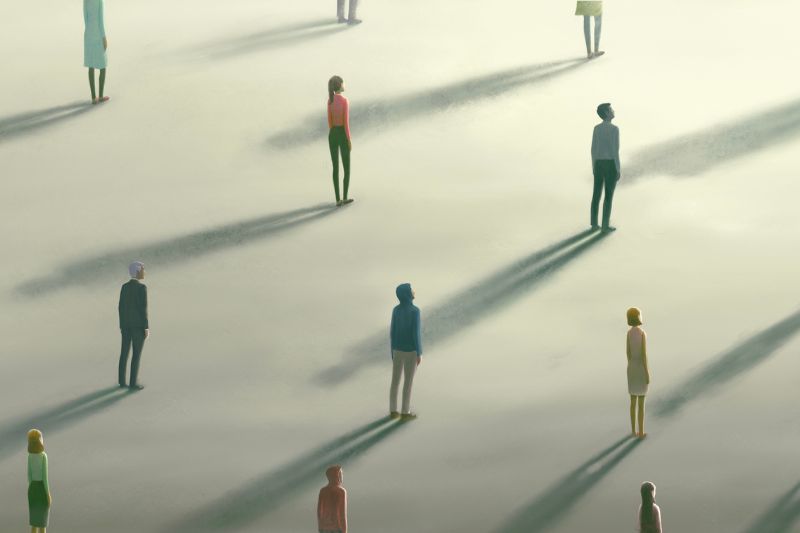Social Inclusion Week can easily be dismissed as like the message on an inspirational poster in a government office — nice in theory, vague in execution, and ignored by most people. But it does invite us to remember people who are marginal or excluded in our society.

For that reason, it is timely. In recent years we have seen a greater awareness of the exclusion of groups of people from society and more insistent calls for inclusion. They include women, persons with disability, persons who identify themselves as LGBTQIA+, and Indigenous Australians. We have also seen, for example in some polemic during the Voice Referendum, a backlash from others who wished to maintain attitudes and institutions that exclude people from equality. Bitter conflict between people who argue for different forms of inclusion, as among LGBTQIA+ advocates, has also been evident. Social inclusion is contested.
It is worth reflecting on why this is so. Part of the reason is the paradox that in human society inclusion is often created and policed by exclusion. This is evident in the behaviour of children, always also a reliable index of much adult behaviour. Ingroups of children often define themselves by their difference from other groups and outsiders. They exclude those seen as different. The more intense the allegiance to the in-group, the stronger is the antipathy to those excluded and the enforcement of exclusion.
This behaviour is not confined to children. In religious, sporting and other groups of adults, a strong sense of identity is often accompanied by a corresponding antipathy to other similar groups and the readiness to expel unloyal people from their own circle. Catholics and Protestants, conservatives and liberals, supporters and critics of Israel’s actions in Gaza, come to mind. It is perhaps most paradoxically displayed in the attempt by people who are united by a commitment to seek inclusion in a more just society, simultaneously to exclude from society and memory those who have historically or currently excluded them.
Parents of children born with Down Children, too, sometimes report that some people are surprised, believing that they should have had an abortion. Is it possible that here a strong commitment to reproductive rights can sometimes be seen as consistent with excluding a child with disability from full humanity?
Such apparently contradictory behaviour may stem from an archetypal hunger to belong and from a corresponding anxiety about exclusion. Anxiety may reflect and breed self-doubt and fear that we are unworthy. Such fear can never be removed by acceptance into a group. Acceptance will only devalue the group in the eyes of the person who is accepted. Anxiety and self-doubt will also encourage people in the group to seek reassurance by excluding others and by tightening the criteria for membership. Groucho Marx captured the dynamic in his famous quip, ‘I wouldn't want to belong to a club that would have me as a member’.
This dynamic helps us understand the simultaneous passionate desire that members excluded from a social group be fully accepted into society and an equally passionate readiness to exclude from society the people who have not accepted them. The current taste for cancelling may have its roots in anxiety and self-doubt, not in hatred.
'Among [the codes of social friendship] are the readiness to reach out to others, to apologise, to cross boundaries, and to recognise the childish roots of social exclusion. This is the winding road to social inclusion.'
If is so, it suggests that the movement to social inclusion will never be in a straight line and progressive but turbulent and tidal. If our sense of ourselves is shaped by belonging to a group whose identity is shaped by excluding other groups, we shall naturally resist more vigorously any movement to include these groups in society. Our opposition will be rooted in an anxiety about our own identity which, though perhaps unrecognised, is still visceral.
In a time of anxiety about security, living standards and rapid technological change, such as ours, we might expect anxiety about identity to grow. It will naturally express itself in our desire for inclusion in society. It may also find expression in the desire to exclude people who oppose or are different from us. It fuels the ‘culture wars’ which are best characterised as schoolyard games. Christians may find the dynamic of social exclusion best caught in the Gospel story of the rich man who prayed ostentatiously to show that he belonged in the temple, and thanked God he was not like the poor man on the floor at the back.
In such a climate, programs of social inclusion are important. Societies need to commend and image generosity, openness, courtesy and welcoming difference. But such public exhortation is about holding ground, not winning it. If the roots of inclusion or exclusion lie deep in human desire, the growth of social inclusion will depend on a growth in self-awareness that reveals the ways in which we exclude.
The Gospel description of the prayer of the poor man in the temple makes this point. He simply repeats the phrase, ‘Lord, have mercy on me a sinner’. His awareness of his own fallible humanity and his corresponding freedom from comparing himself to the rich man leaves him free to develop the codes of social friendship. Among these are the readiness to reach out to others, to apologise, to cross boundaries, and to recognise the childish roots of social exclusion. This is the winding road to social inclusion.
Andrew Hamilton is consulting editor of Eureka Street, and writer at Jesuit Social Services.
Main image: Getty images